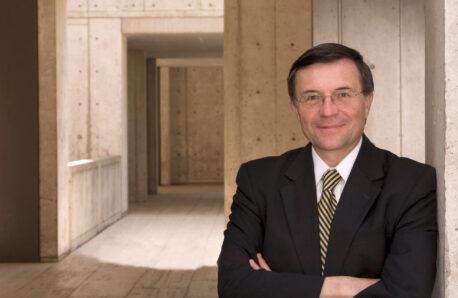
October 13, 2025
LA JOLLA—The National Institutes of Health (NIH) has selected Salk neuroscientist Terrence Sejnowski, PhD, to receive a 2025 NIH Director’s Pioneer Award. The prestigious award is given to scientists proposing exceptionally creative high-risk, high-reward research.

Sejnowski is a professor, head of the Computational Neurobiology Laboratory, and holder of the Francis Crick Chair at Salk. The NIH award will provide $3.5 million over the next five years to support his lab’s latest project, which will use advanced computational techniques to analyze and model the neural circuit dynamics of working memory. The findings will help neuroscientists better understand and treat memory issues in mental disorders such as schizophrenia, traumatic brain injury (TBI), and post-traumatic stress disorder (PTSD).
“Throughout his career, Terry has been a pioneer of new ideas and technologies in neuroscience,” says Salk President Gerald Joyce, MD, PhD. “This award affirms the power of his bold thinking and will enable him to continue doing the innovative research he does best.”
Sejnowski is inextricable from the history of neuroeconomics, neuroanatomy, neurophysiology, psychology, and artificial intelligence. The present-day questions and progress in each of these fields have been shaped by Sejnowski’s work, among which is his 1985 invention of the Boltzmann machine alongside computer scientist and colleague Geoffrey Hinton, PhD.
The Boltzmann machine is the first algorithm to solve the problem of learning in multilayered neural networks. Today, 40 years later, it remains the most biologically plausible algorithm for artificial neural networks. Sejnowski also pioneered a computer program called NETtalk, which could learn how to turn written text into speech like the human brain. These accomplishments laid the groundwork for modern artificial intelligence and tools like ChatGPT.
Sejnowski has also contributed to advances in human brain imaging and our understanding of the neural basis of behavior. Most recently, Sejnowski developed a new technique to measure the precision of synapse strength and plasticity, supporting new research on learning and memory, and examining how these processes decline in aging and disease.
This latest award is one of many prestigious recognitions Sejnowski has received over the years, including the 2024 Brain Prize and the 2022 Gruber Prize in Neuroscience. He is also a member of the United States National Academy of Sciences, National Academy of Medicine, National Academy of Engineering, National Academy of Inventors, and the American Philosophical Society, as well as a Fellow of the Royal Society in the United Kingdom.
Office of Communications
Tel: (858) 453-4100
press@salk.edu
The Salk Institute is an independent, nonprofit research institute founded in 1960 by Jonas Salk, developer of the first safe and effective polio vaccine. The Institute’s mission is to drive foundational, collaborative, risk-taking research that addresses society’s most pressing challenges, including cancer, Alzheimer’s, and agricultural resilience. This foundational science underpins all translational efforts, generating insights that enable new medicines and innovations worldwide.